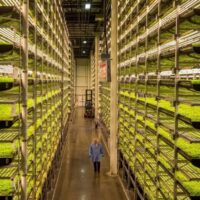
Image Credit: CNBC
Every week we track the business, tech and investment trends in CPG, retail, restaurants, agriculture, cooking and health, so you don’t have to. Here are some of this week’s top headlines.
In a major milestone for the food industry, the USDA has granted inspection approvals to Upside Foods, Good Meat, and Joinn Biologics, signaling the imminent arrival of cell-cultured chicken in the American market. Meanwhile, Daily Harvest, a prominent $1b food startup, grapples with the aftermath of a tumultuous year. CEO Rachel Drori breaks her silence on the inclusion of tara flour in its products and what came of the lawsuits and illnesses that followed.
In other news, we’ve wrapped the first season of our podcast in partnership with AgFunder: New Food Order, a nuanced investigation into the business of tackling our climate and social crises through food and agriculture. Read all about why we launched the podcast, and be sure to subscribe and share!
Our newsletter takes a lot of time and resources to produce. Make a one time or monthly contribution to help us keep it going. Whether it’s $5 or $500, every bit helps and shows us that you value our work.
1. Cell-Cultured Chicken Gets the Final Green Light from USDA – Washington Post
The USDA announced it has issued grants of inspection to Upside Foods, Good Meat and Good Meat’s manufacturing partner, Joinn Biologics, the first companies aiming to bring the much-awaited product to the American market.
2. Daily Harvest’s Toxic Year: How the $1B Food Startup’s Quest For a New Ingredient Sent Customers to the ER – Fast Company
The CEO speaks for the first time about the tara flour that sickened hundreds, led to lawsuits and revealed big problems in US food safety.
3. The Age of Disruptive Products Is Over, Rabobank Says – Food Dive
Companies are focusing on more incremental innovation as investment capital tightens up and consumer appetite for new things has been lacking.
4. Cultivated Meat from Cows: How Omeat Uses Plasma to Grow Beef – Food Dive
The company, which has already raised $40m from key investors, says it can make products at the same cost as traditional meat.
5. These Soybeans Taste Like Pork – Fast Company
Moolec genetically engineered soybeans to make pig protein—and they want to use the ingredient to scale up realistic meat alternatives.
6. Ocado Shares Soar on Reports of Bid Interest From Tech Firms Including Amazon – Bloomberg
Ocado shares jumped as much as 47%, the most in five years, on speculation of bid interest from Amazon.
7. As Others Burned Millions to Build Robot Restaurants, This Operator Automated His for Just $200K – Forbes
Andrew Simmons plans to expand his formula for restaurants into a chain, and believes he would need just 4% of the capital Zume raised over its lifetime ($423m) to create a 100-restaurant chain and get to $100m in revenue.
8. Restaurant Tech Learns the Price of Unbridled Growth – Restaurant Business
Overhauls at Olo, Grubhub and Nextbite signal the end of the pandemic tech boom, and the need for more responsible growth.
9. New AI and GPS Technology Will Protect Oceans and Prevent Fish Stock Depletion – VegNews
The Audacious Project has given $60m in funding to Global Fishing Watch, as it strives to create a map of all the fishing vessels operating on the ocean.
10. How Benefit Cuts May Create a ‘Perfect Storm’ for Food Insecurity – Civil Eats
Hunger advocates and researchers believe the end to emergency allotments—coupled with revised work requirements for SNAP—will pressure food banks, hurt public health, impact kids and revive old prejudices.





